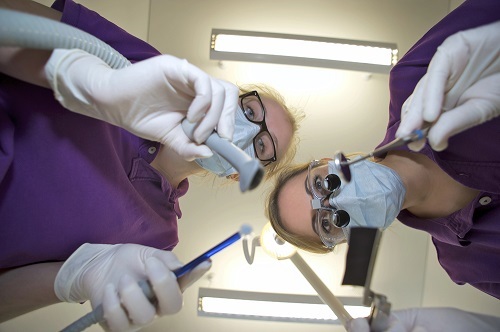Adam Smith Goes to the Dentist

Thoughts from the dentist's chair about pain prevention and cooperation.
There are few places as boring as the dentist’s chair. That means there are few places where it is as easy to think about the miracle of widespread social cooperation.
As someone who has essentially no tolerance for pain, I’m grateful for the unknown army of people willing to work on my behalf to prevent it. When people talk about how our ancestors didn’t have the luxury of modern dentistry, I think about what it would have been like to go through life with a mouth full of rotten teeth that could only be “fixed" by anesthetic-free removal.
It’s enough to make one deliriously grateful for what we take for granted.
In my favorite chapter in The Wealth of Nations, Adam Smith explains the unique position in which people find themselves: “In civilized society he stands at all times in need of the cooperation and assistance of great multitudes, while his whole life is scarce sufficient to gain the friendship of a few persons.” Animals, by contrast, don’t find themselves in the same tangled social web: “In almost every other race of animals each individual, when it is grown up to maturity, is entirely independent, and in its natural state has occasion for the assistance of no other living creature.” Their independence comes at a price: they must settle for simple communication, do without culture or technology, and live a life of peril navigating nature red in tooth and claw.
How do people enlist the cooperation of this great multitude? Friendship won’t work. We can’t make enough friends. As Smith notes, someone’s “whole life is scarce sufficient to gain the friendship of a few persons.” Meaningful, intimate friendships are forged over years or decades of laughing and crying together. That’s not easy to do with more than a few people.
Hence the problem Smith identifies: “But man has almost constant occasion for the help of his brethren, and it is vain for him to expect it from their benevolence only.” He explains that we secure their assistance by appealing to their interests rather than our wants.
I don’t have the knowledge to fix my own teeth, and trying to do so would almost certainly end in farce or tragedy. Instead, I secure the cooperation of the dentist and her assistant by appealing to their interest. They may not be interested in what I produce (economics lectures, research, and articles), but they are interested in money. Money is a humane technology that makes it easier for strangers with different wants and goals to cooperate advantageously.
The same goes for the people at the phone company or who program Apple Maps so I can get from one place to another. At the next level of cooperation, we have the person who grew the coffee steaming on the desk of the guy who wrote the code that ran Apple Maps and helped me get to the dentist on time. The people at Underwriter’s Laboratory who tested the lightbulbs I spent so much time staring at didn’t do so because they were thinking about me specifically. They did it because it was in their interest: by providing the rigorous and reliable testing and certification that discerning customers want, the people at Underwriter’s Laboratory earn the money necessary to take care of the people and causes that matter to them. They do their job well because those discerning customers can take their business elsewhere.
I doubt that any of these people will ever care about me the way they care about their own families and friends. In a commercial society, however, they are willing to care for me. Not out of care or pity but because I am willing to “care” for them by handing over my money in exchange for their services. I helped fill their wallets and, by extension, their pantries and gas tanks.
As Joseph Schumpeter wrote back in 1942, “There are no doubt some things available to the modern workman that Louis XIV would have been delighted to have but was unable to have–modern dentistry for instance.” Louis the XIV couldn’t have bought a Sonicare toothbrush with all the money in France. I suspect it meant he dealt with a lot more mouth pain than we do. So did Adam Smith–but Smith put his finger on the social process—division of labor driven by exchange and cooperation in free markets—that make our relatively pain-free lives possible.
Want more?
Adam Smith Comics: The Invisible Hand by Doug Curtis and Jeremy Lott
Everybody Loves Mikey by Michael Munger at Econlib
Donald Boudreaux, Michael Munger, and Russ Roberts on Emergent Order at EconTalk
Want more?
Adam Smith Comics: The Invisible Hand by Doug Curtis and Jeremy Lott
Everybody Loves Mikey by Michael Munger at Econlib
Donald Boudreaux, Michael Munger, and Russ Roberts on Emergent Order at EconTalk